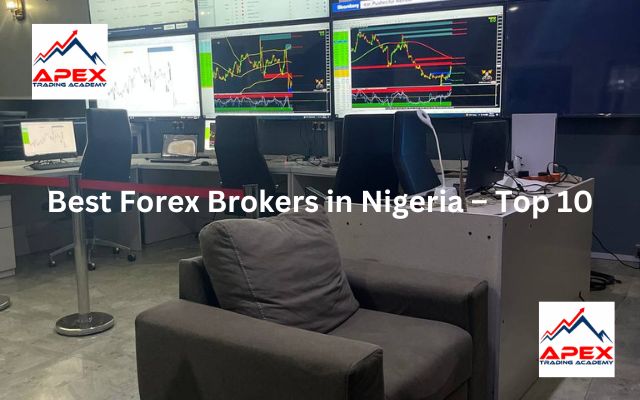
The foreign exchange (forex) market in Nigeria has witnessed exponential growth, reflecting the country’s increasing participation in global financial markets. As more Nigerians embrace forex trading as a means of generating income and diversifying their investment portfolios, the demand for reliable and reputable forex brokers has intensified.
Thus, we provide you with a list of the top 10 best forex brokers in Nigeria, catering to traders of all levels. We provide an in-depth analysis of each broker from regulatory compliance and trading conditions to platform features and customer support. This will help you make informed decisions, keep your fund safe, and trade the forex market with confidence.
What Does a Forex Broker Do?
A forex broker acts as an intermediary, facilitating currency trading for retail investors, corporations, and entities. They provide access to the market, execute trades, offer trading platforms, leverage, and educational tools.
The Top 10 Forex Brokers in Nigeria
When it comes to selecting the best forex broker in Nigeria, traders must consider various factors such as trading conditions, regulation, customer support, and available features. Let’s delve into the top 10 forex brokers in Nigeria, each offering unique advantages to cater to traders’ diverse needs.
1. Exness – Overall Best Forex Broker in Nigeria
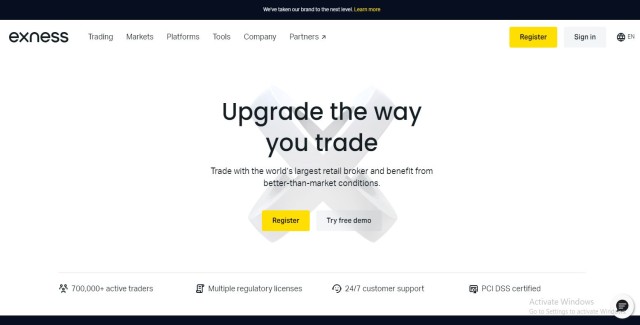
Exness was founded in 2008 with the mission to provide a reliable and transparent trading environment for forex traders worldwide. Since its inception, Exness has grown rapidly, garnering a reputation for excellence in the industry. The broker is known for its commitment to innovation, customer satisfaction, and technological advancement.
It operates under the jurisdiction of reputable regulatory bodies, including the Financial Conduct Authority (FCA) in the UK and the Cyprus Securities and Exchange Commission (CySEC) in Cyprus. This regulatory oversight ensures that Exness adheres to strict standards of financial security, transparency, and client protection.
Exness offers a wide range of trading instruments, including forex pairs, cryptocurrencies, commodities, indices, and stocks. Traders can access these markets through the broker’s user-friendly trading platforms, including MetaTrader 4 and MetaTrader 5.
| Features, | Details |
| Regulation | FCA, CySEC, FSCA, Seychelles FSA |
| Minimum Deposit | $1 |
| Trading Platforms | MetaTrader 4, MetaTrader 5, Exness Trader |
| Spreads | From 0.0 pips |
| Execution Speed | Ultra-fast |
| Assets | Forex, Commodities, Indices, Cryptocurrency |
| Customer Support | 24/7 multilingual support |
Pros:
- Low spreads and competitive pricing.
- Fast execution speed.
- Wide range of trading instruments.
- Regulated by reputable authorities.
Cons:
- Limited educational resources compared to some competitors.
Ratings:
- Trading Conditions: 5/5
- Regulation: 5/5
- Customer Support: 4.5/5
- Overall Rating: 4.8/5
2. HF Markets (HFM) – Best Forex Broker for Beginners
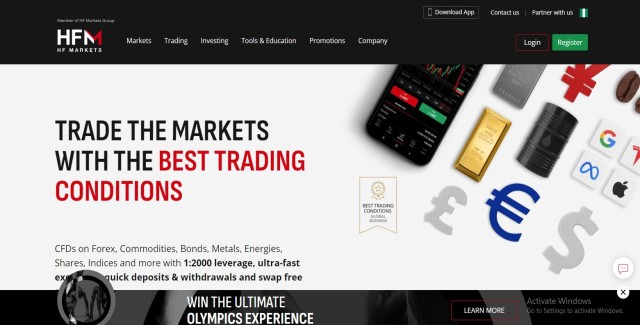
HF Markets (HFM), formerly known as HotForex, was established in 2010 and has since become a leading online forex broker. The company’s mission is to provide traders with a user-friendly trading environment, competitive pricing, and exceptional customer service.
HotForex offers a range of account types to cater to the diverse needs of traders, including Micro, Premium, Zero Spread, and Auto Account options. Each account type comes with its own set of features and benefits, making it easy for beginners to find the right fit for their trading style and preferences.
One of HotForex’s standout features is its dedication to education and training. The broker provides a wealth of educational resources, including trading tutorials, webinars, articles, and market analysis. These resources are invaluable for beginners looking to learn the ins and outs of forex trading.
| Features | Details |
| Regulation | FCA, CySEC, FSCA, DFSA, FSA |
| Minimum Deposit | $5 |
| Trading Platforms | MetaTrader 4, MetaTrader 5, HF App |
| Spreads | From 0.0 pips |
| Account Types | Micro, Premium, Zero, Auto |
| Educational Tools | Webinars, Video Tutorials, eBooks |
Pros:
- Beginner-friendly platforms.
- Comprehensive educational resources.
- Multiple account types to choose from.
- Regulated by reputable authorities.
Cons:
- Limited range of trading instruments compared to some brokers.
Ratings:
- User-Friendliness: 5/5
- Education: 5/5
- Regulation: 4.5/5
- Overall Rating: 4.7/5
3. FXTM – Best Forex Broker for Naira CFDs on USD/NGN & EUR/NGN
ForexTime (FXTM) was founded in 2011 with the goal of providing innovative trading solutions to forex traders around the world. The broker is known for its commitment to transparency, reliability, and client satisfaction.
FXTM offers a wide range of trading products, including forex pairs, CFDs, commodities, and indices. One of its standout offerings is Naira CFDs on USD/NGN and EUR/NGN, which allows Nigerian traders to speculate on the exchange rate between the Nigerian Naira and major currency pairs.
The broker provides traders with access to cutting-edge trading platforms, including MetaTrader 4 and MetaTrader 5, as well as its own proprietary platform, FXTM Trader. These platforms are known for their advanced charting tools, technical analysis capabilities, and user-friendly interfaces.
| Features | Details |
| Regulation | FCA, CySEC, FSCA, FSC |
| Minimum Deposit | $10 |
| Trading Platforms | MetaTrader 4, MetaTrader 5, FXTM Trader |
| Spreads | From 0.1 pips |
| Account Types | Standard, Cent, Shares, ECN |
| Naira CFDs | USD/NGN, EUR/NGN |
Pros:
- Wide range of account types to suit different traders.
- Competitive spreads and low minimum deposit.
- Naira CFDs available for Nigerian traders.
- Regulated by reputable authorities.
Cons:
- Limited local payment options compared to some brokers.
Ratings:
- Trading Products: 5/5
- Regulation: 5/5
- Account Options: 4.5/5
- Overall Rating: 4.8/5
4. XM Broker – Best Forex Broker for Spread Only Trading Account
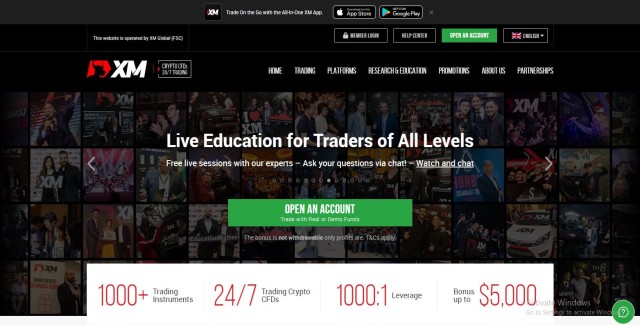
XM Broker, operated by Trading Point Group, has been serving traders since 2009. The broker’s goal is to offer transparent and fair trading conditions to clients globally. With a strong emphasis on customer satisfaction and innovation, XM has become a trusted name in the forex industry.
The broker distinguishes itself by offering a spread-only trading account, providing traders with transparent pricing and no hidden fees. This account type is ideal for those who prefer simplicity and clarity in their trading costs. Additionally, XM offers a variety of account types to cater to different trading styles and preferences.
XM provides access to a wide range of trading instruments, including forex pairs, commodities, indices, stocks, and cryptocurrencies. Traders can access these markets through XM’s user-friendly trading platforms, including MetaTrader 4 and MetaTrader 5, as well as XM WebTrader.
| Features | Details |
| Regulation | CySEC, IFSC, ASIC, DFSA |
| Minimum Deposit | $5 |
| Trading Platforms | MetaTrader 4, MetaTrader 5, XM WebTrader |
| Spreads | From 0.0 pips |
| Account Types | Micro, Standard, XM Zero |
| Educational Tools | Webinars, Video Tutorials, Seminars |
Pros:
- Transparent pricing with spread-only trading accounts.
- Multiple trading platforms available.
- Low minimum deposit requirement.
- Regulated by reputable authorities.
Cons:
- Limited range of account types compared to some brokers.
- Educational resources could be more extensive.
Ratings:
- Pricing Transparency: 4.5/5
- Trading Platforms: 4/5
- Regulation: 5/5
- Overall Rating: 4.4/5
5. AvaTrade – Best Forex Broker for Fixed Spreads
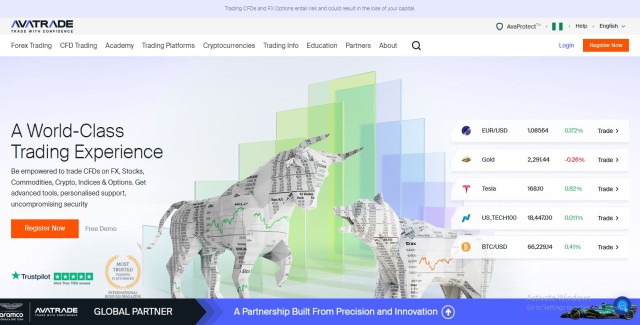
AvaTrade was established in 2006 with the mission of providing a reliable and user-friendly trading environment for forex traders worldwide. The broker is known for its commitment to innovation, customer service, and regulatory compliance.
It stands out for offering fixed spreads, providing traders with certainty over their trading costs. Fixed spreads remain constant regardless of market conditions, making them ideal for traders who value predictability in their trading expenses.
In addition to fixed spreads, AvaTrade offers a wide range of trading platforms, including MetaTrader 4, MetaTrader 5, AvaTradeGO, and AvaOptions. These platforms cater to traders of all experience levels and provide advanced charting tools, technical analysis capabilities, and customizable trading environments.
| Features | Details |
| Regulation | ASIC, FSCA, FSA, ADGM, BVI FSC |
| Minimum Deposit | $100 |
| Trading Platforms | MetaTrader 4, MetaTrader 5, AvaTradeGO |
| Spreads | Fixed spreads on certain instruments |
| Account Types | Retail, Professional, Islamic |
| Fixed Spread Pairs | EUR/USD, GBP/USD, USD/JPY, and more |
Pros:
- Fixed spreads for certainty over trading costs.
- Multiple trading platforms available.
- Islamic accounts offered for Sharia-compliant trading.
- Regulated by reputable authorities.
Cons:
- Higher minimum deposit compared to some brokers.
- Limited range of fixed spread pairs.
Ratings:
- Fixed Spread Offering: 4.5/5
- Trading Platforms: 4.5/5
- Regulation: 4.5/5
- Overall Rating: 4.6/5
6. OctaFX – Good Forex Broker with Local Funding Options in Nigeria
OctaFX was founded in 2011 with the aim of providing traders with a reliable and transparent trading environment. The broker has since grown rapidly, expanding its client base globally and earning a reputation for excellence in the industry.
It distinguishes itself by offering local funding options for Nigerian traders, making it convenient to deposit and withdraw funds. This feature eliminates the hassle of international transactions and ensures quick and easy access to funds for traders in Nigeria.
OctaFX also provides competitive trading conditions, including low spreads, fast execution, and a wide range of trading instruments. Traders can access these markets through OctaFX’s user-friendly trading platforms, including MetaTrader 4 and MetaTrader 5.
| Features | Details |
| Regulation | CySEC, SVG |
| Minimum Deposit | $50 |
| Trading Platforms | MetaTrader 4, MetaTrader 5, cTrader |
| Spreads | From 0.2 pips |
| Account Types | Micro, Pro, ECN |
| Local Payment | Bank Transfer, Cards, Local Exchangers |
Pros:
- Local funding options for Nigerian traders.
- Competitive trading conditions with low spreads.
- Multiple trading platforms available.
- Regulated by reputable authorities.
Cons:
- Limited range of regulatory licenses compared to some brokers.
Ratings:
- Local Payment Options: 4.5/5
- Trading Conditions: 4/5
- Regulation: 4/5
- Overall Rating: 4.3/5
7. FxPro – Best Forex Broker with Multiple Platforms at Low Cost
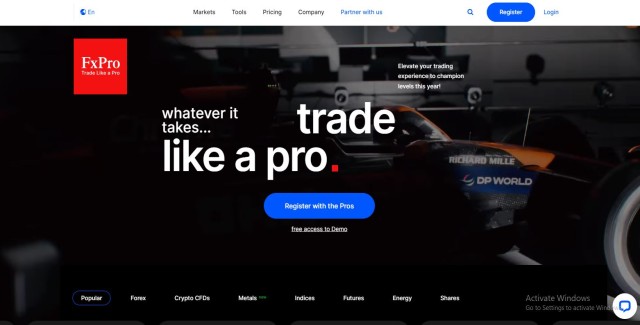
Founded in 2006, FxPro has grown to become one of the leading forex brokers globally, serving clients in over 170 countries. The broker is known for its commitment to providing traders with access to multiple trading platforms and competitive pricing.
FxPro offers a range of trading platforms, including MetaTrader 4, MetaTrader 5, cTrader, and FxPro Edge. These platforms cater to traders of all experience levels and provide advanced charting tools, technical analysis capabilities, and customizable trading environments.
One of FxPro’s key features is its low-cost trading model, which offers competitive pricing and tight spreads. The broker is able to achieve low costs through its high trading volumes and efficient execution, making it an attractive option for cost-conscious traders.
| Features | Details |
| Regulation | FCA, CySEC, SCB, FSCA |
| Minimum Deposit | $100 |
| Trading Platforms | MetaTrader 4, MetaTrader 5, cTrader, FxPro Edge |
| Spreads | From 0.0 pips |
| Account Types | MT4, MT5, cTrader, FxPro Edge |
Pros:
- Multiple trading platforms available for diverse trading preferences.
- Competitive pricing with tight spreads.
- Regulated by reputable authorities.
- Transparent pricing with no hidden fees.
Cons:
- Limited educational resources compared to some brokers.
- Higher minimum deposit requirement.
Ratings:
- Trading Platforms: 5/5
- Pricing: 4.5/5
- Regulation: 4.5/5
- Overall Rating: 4.7/5
8. Tickmill – Best Regulated Forex Broker with Pro Accounts
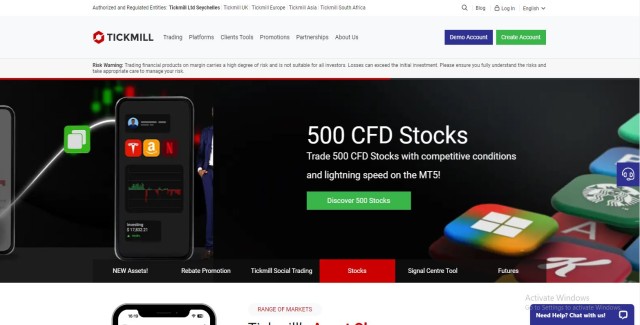
Tickmill was established in 2014 with the mission of providing traders with a reliable and transparent trading environment. The broker is regulated by multiple financial authorities, including the FCA, CySEC, and FSCA, ensuring the highest standards of security and compliance.
It distinguishes itself by offering pro accounts with competitive pricing and execution. These accounts are designed for experienced traders who require tight spreads and fast execution. In addition to pro accounts, Tickmill offers a range of account types to cater to different trading styles and preferences.
Tickmill provides access to a wide range of markets, including forex, indices, commodities, and bonds. Traders can access these markets through Tickmill’s user-friendly trading platforms, including MetaTrader 4 and MetaTrader 5.
| Features | Details |
| Regulation | FCA, CySEC, FSCA, FSA, Labuan FSA |
| Minimum Deposit | $100 |
| Trading Platforms | MetaTrader 4, MetaTrader 5, WebTrader |
| Spreads | From 0.0 pips |
| Account Types | Classic, Pro, VIP |
Pros:
- Regulated by multiple reputable authorities.
- Competitive pricing with tight spreads.
- Professional accounts available for experienced traders.
- Transparent pricing and fast execution.
Cons:
- Limited range of trading platforms compared to some brokers.
- Higher minimum deposit requirement.
Ratings:
- Regulation: 5/5
- Pricing: 4.5/5
- Trading Platforms: 4/5
- Overall Rating: 4.6/5
9. IC Markets – ASIC Regulated Forex Broker
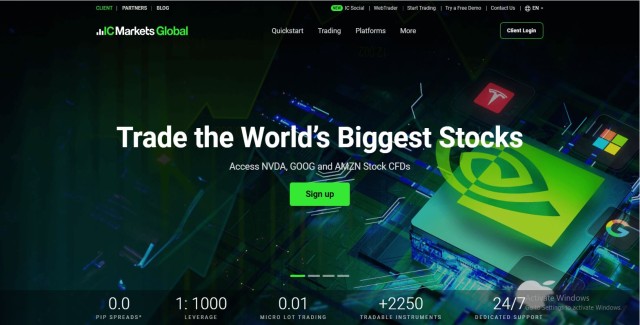
IC Markets was founded in 2007 in Sydney, Australia, with the aim of providing traders with access to the forex market with low-latency execution and competitive pricing. The broker is regulated by the Australian Securities and Investments Commission (ASIC), one of the most respected regulatory bodies globally.
It prides itself on offering traders institutional-grade trading conditions with tight spreads, fast execution, and deep liquidity. The broker utilizes cutting-edge technology to ensure that traders receive the best possible trading experience, with servers located in the Equinix data centers in New York (NY4), London (LD5), and Tokyo (TY3) to minimize latency.
Traders can choose from a range of trading platforms, including MetaTrader 4, MetaTrader 5, and cTrader, all of which offer advanced charting tools, technical analysis capabilities, and customizable trading environments. IC Markets also provides access to a wide range of trading instruments, including forex, indices, commodities, and cryptocurrencies.
| Features | Details |
| Regulation | ASIC, CySEC |
| Minimum Deposit | $200 |
| Trading Platforms | MetaTrader 4, MetaTrader 5, cTrader |
| Spreads | From 0.0 pips |
| Account Types | Raw Spread, Standard |
Pros:
- Regulated by ASIC for a secure trading environment.
- Competitive pricing with tight spreads.
- Multiple trading platforms available.
- Transparent pricing and fast execution.
Cons:
- Higher minimum deposit requirement compared to some brokers.
- Limited range of account types.
Ratings:
- Regulation: 5/5
- Pricing: 4.5/5
- Trading Platforms: 4/5
- Overall Rating: 4.6/5
10. PepperStone – Forex Broker with Commissions
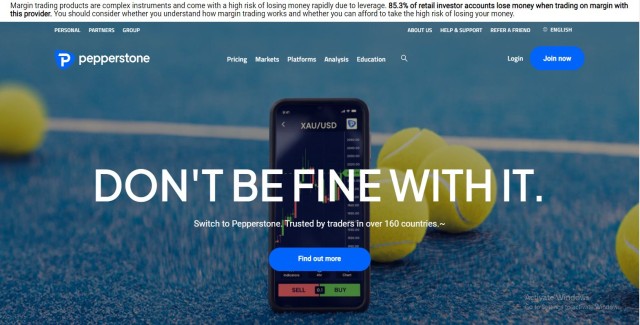
Pepperstone was founded in 2010 in Melbourne, Australia, with the goal of providing traders with access to the forex market with low-cost trading and fast execution. The broker is regulated by the Australian Securities and Investments Commission (ASIC) and the Financial Conduct Authority (FCA) in the UK, providing traders with a high level of security and trust.
It differentiates itself by offering commission-based trading, which allows traders to benefit from tight spreads and fast execution. The broker offers two main account types: Razor and Standard. The Razor account is designed for traders who require the lowest possible spreads and are willing to pay a commission per trade, while the Standard account offers commission-free trading with slightly wider spreads.
Traders can access Pepperstone’s wide range of trading instruments, including forex, commodities, cryptocurrencies, and indices, through the broker’s user-friendly trading platforms, including MetaTrader 4, MetaTrader 5, and cTrader.
| Features | Details |
| Regulation | ASIC, FCA, DFSA, CySEC |
| Minimum Deposit | $200 |
| Trading Platforms | MetaTrader 4, MetaTrader 5, cTrader |
| Spreads | From 0.0 pips |
| Commission | $3.5 per standard lot (round turn) |
Pros:
- Commission-based trading with transparent pricing.
- Regulated by multiple reputable authorities.
- Competitive pricing with tight spreads.
- Multiple trading platforms available.
Cons:
- Higher minimum deposit requirement compared to some brokers.
- Commission fees may add to trading costs.
Ratings:
- Pricing: 4/5
- Regulation: 5/5
- Trading Platforms: 4/5
- Overall Rating: 4.3/5
How to Choose a Reliable Forex Broker in Nigeria
When selecting a forex broker in Nigeria, there are several factors to consider to ensure a safe and optimal trading experience.
Here are 9 factors you should consider before choosing a forex broker in Nigeria:
-
Tier 1 Regulation and Reputation
The first and most crucial factor to consider is regulation. Look for brokers regulated by reputable authorities such as the Financial Conduct Authority (FCA) in the UK, the Cyprus Securities and Exchange Commission (CySEC), or the Australian Securities and Investments Commission (ASIC).
Regulation ensures that the broker operates under strict guidelines, providing investor protection and security of funds. Additionally, consider the broker’s reputation in the industry by checking reviews and testimonials from other traders.
-
Local Presence and Support
It’s beneficial to choose a broker with a local presence or strong customer support in Nigeria. This ensures easier communication and assistance, especially when dealing with account-related issues or inquiries.
Brokers with local offices or dedicated Nigerian customer support teams can offer more personalized assistance and address concerns promptly.
-
Availability Across Platforms and Ease of Use
Evaluate the broker’s trading platforms and ensure they are user-friendly and accessible across various devices. Look for platforms that offer intuitive navigation, advanced charting tools, and quick order execution.
Mobile trading apps are also essential for traders who prefer to trade on the go, so choose brokers that provide reliable mobile apps compatible with your device.
-
Overall Fees
Compare the spreads, commissions, and other trading fees charged by different brokers to minimize your trading costs. While some brokers offer tight spreads with no commissions, others may have wider spreads but lower commission fees.
Consider your trading style and frequency to determine which fee structure aligns best with your trading preferences and budget.
-
Minimum Deposit
Check the broker’s minimum deposit requirement to ensure it suits your financial capabilities and trading goals. Some brokers may have high minimum deposit requirements, while others offer more flexibility with lower initial deposits.
Choose a broker with a minimum deposit that you’re comfortable with, keeping in mind that higher deposits may unlock additional features or benefits.
-
Local Payment Options
Opt for brokers that support convenient and secure payment methods for deposits and withdrawals in Nigeria. Look for brokers that accept local payment options such as bank transfers, credit/debit cards, and electronic wallets like PayPal or Skrill.
Ensure the payment process is seamless and efficient to avoid any delays or complications when funding your trading account or withdrawing profits.
-
Mobile App and Trading Platforms
Consider brokers that offer mobile trading apps and support for popular platforms like MetaTrader 4 (MT4) or MetaTrader 5 (MT5). Mobile trading apps allow you to monitor the markets, execute trades, and manage your account from anywhere with an internet connection.
Additionally, MetaTrader platforms are widely used and trusted by traders worldwide for their advanced features, customization options, and compatibility with expert advisors (EAs) and trading algorithms.
-
Number of Instruments and Access to Global Markets
Look for brokers that offer a diverse range of trading instruments, including forex pairs, indices, commodities, stocks, and cryptocurrencies. Access to a wide range of markets allows you to diversify your trading portfolio and capitalize on various market opportunities.
Choose brokers that provide access to global markets and multiple asset classes to expand your trading options and potential profits.
-
Security of App/Platform
Prioritize the security and reliability of the broker’s trading platform to safeguard your funds and personal information. Ensure the platform incorporates robust security measures such as encryption protocols, firewall protection, and two-factor authentication (2FA) to prevent unauthorized access and data breaches.
Additionally, choose brokers with a track record of maintaining uptime and stability to avoid disruptions or technical issues during critical trading periods.
How to Open an Account with a Forex Broker in Nigeria
Opening an account with a forex broker in Nigeria is a simple process that can be completed in a few easy steps.
Here’s a step-by-step guide on how to open an with a forex broker in Nigeria:
- Choose a Reputable Broker: The first step is to research and select a reputable forex broker that aligns with your trading preferences, regulatory requirements, and financial goals. Consider factors such as regulation, trading conditions, available assets, and customer support when choosing a broker.
- Visit the Broker’s Website: Once you’ve chosen a broker, visit their official website and locate the “Open Account,” “Sign Up,” or “Register” button. This button is typically prominently displayed on the homepage or in the navigation menu.
- Fill Out the Registration Form: Click on the registration button to access the account registration form. Fill out the form with accurate personal information, including your full name, email address, phone number, country of residence, and preferred currency. You may also need to choose your account type, such as a standard, mini, or Islamic account, depending on the broker’s offerings.
- Verify Your Identity: To comply with regulatory requirements and prevent fraud, most brokers require new clients to verify their identity. You’ll need to provide valid identification documents, such as a government-issued ID (passport, driver’s license) and proof of address (utility bill, bank statement). Follow the broker’s instructions to upload clear copies of these documents through their secure verification portal.
- Fund Your Trading Account: Once your account registration and identity verification are complete, it’s time to fund your trading account. Most brokers offer multiple payment methods for deposits, including bank transfers, credit/debit cards, electronic wallets (e-wallets), and cryptocurrency. Choose the payment method that is most convenient for you and follow the instructions to deposit funds into your trading account. Be aware of any deposit fees or minimum deposit requirements imposed by the broker.
- Download Trading Platform or Use Web-Based Platform: Depending on the broker’s offerings, you can either download their trading platform to your desktop or mobile device or access the web-based platform directly through your internet browser. The trading platform is where you’ll execute trades, analyze market data, and manage your trading account. Familiarize yourself with the platform’s features and tools to make the most of your trading experience.
- Start Trading: With your account funded and the trading platform set up, you’re ready to start trading forex! Explore the available currency pairs, analyze market trends, and execute trades based on your trading strategy and risk tolerance. Remember to practice responsible risk management and only trade with funds you can afford to lose.
Can I trade forex without a broker?
No, you need a broker to access the forex market, execute trades, and provide trading platforms. Brokers act as intermediaries between traders and the market.
What is the minimum Deposit at Forex Brokers in Nigeria?
The minimum deposit requirement can range from as low as $1 to several hundred dollars or more. It varies depending on the broker and the type of account.
Islamic Accounts in Nigeria: Adhering to Sharia Law
In Nigeria, as in many other parts of the world, Islamic forex accounts provide an avenue for Muslim traders to engage in the foreign exchange market while remaining compliant with Sharia law. These accounts, also known as swap-free accounts, are tailored to meet the specific religious requirements of Islamic finance.
Understanding Sharia Law and Forex Trading
Sharia law prohibits the giving or receiving of interest payments, known as Riba, as it is considered exploitative and unjust. In the context of forex trading, traditional accounts may involve the payment or accrual of overnight interest, also known as swap or rollover fees, for positions held overnight. This conflicts with Islamic principles, leading to the need for alternative trading solutions.
Features of Islamic Forex Accounts
Islamic forex accounts are structured to eliminate interest payments, ensuring compliance with Sharia law.
Here are some key features of Islamic account:
- Swap-Free Trading: Islamic accounts are swap-free, meaning there are no overnight interest charges or credits applied to positions held overnight. Instead, brokers may charge a fixed administration fee or widen spreads slightly to compensate for the absence of swaps.
- No Riba: By eliminating interest payments, Islamic forex accounts ensure that trades are conducted in accordance with Islamic principles, avoiding the prohibition of Riba.
- Halal Trading Conditions: Muslim traders can participate in forex trading with peace of mind, knowing that their trading activities are Halal (permissible) under Sharia law.
- Full Access to Market: Islamic accounts provide traders with the same access to currency pairs, trading platforms, and analytical tools as conventional accounts, allowing them to execute trades based on their strategies and preferences.
How to Open an Islamic Account
Opening an Islamic forex account follows the same process as opening a conventional trading account. Traders simply need to choose a broker that offers Islamic accounts, complete the registration process, and provide the necessary documentation for verification, and identify as a Muslim. Once the account is approved, traders can fund their accounts and start trading without the worry of interest payments.
Benefits of Islamic Accounts
- Compliance with Sharia Law: Islamic forex accounts enable Muslim traders to engage in forex trading while adhering to the principles of Sharia law.
- Ethical Trading: Traders can participate in the forex market without compromising their religious beliefs, ensuring ethical and responsible trading practices.
- No Overnight Interest: Swap-free accounts eliminate the need for traders to pay or receive overnight interest, providing a transparent and fair trading environment.
- Equal Opportunities: Islamic accounts offer Muslim traders the same opportunities for success in the forex market as their non-Muslim counterparts, promoting inclusivity and diversity in the financial markets.
Forex Regulation in Nigeria: Safeguarding Trader Interests
In Nigeria, forex regulation is essential for maintaining the integrity of the financial markets and protecting the interests of traders. The regulatory framework is overseen by two primary authorities: the Central Bank of Nigeria (CBN) and the Securities and Exchange Commission (SEC). Let’s delve deeper into the regulatory landscape and explore how traders can verify a broker’s authorization in Nigeria.
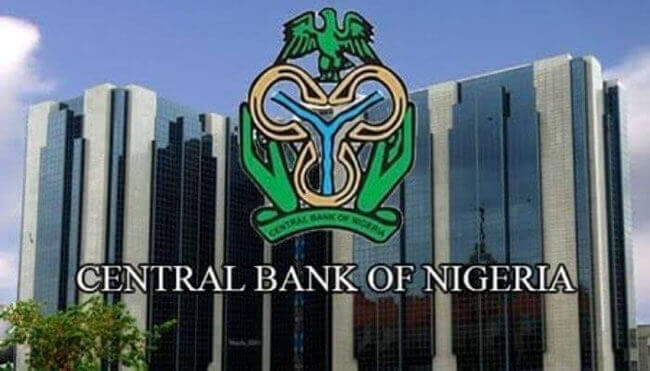
Central Bank of Nigeria (CBN)
As the country’s central banking authority, the Central Bank of Nigeria (CBN) plays a crucial role in regulating the forex market. It is responsible for formulating and implementing monetary policies, including those related to foreign exchange transactions. The CBN monitors the activities of authorized dealers, licensed bureaux de change, and other entities involved in foreign exchange transactions to ensure compliance with regulatory guidelines.
Securities and Exchange Commission (SEC)
The Securities and Exchange Commission (SEC) oversees the capital markets in Nigeria, including the regulation of forex trading. While the SEC’s primary focus is on securities trading, it also regulates forex brokers and other market participants to maintain market integrity and investor protection. The SEC works in collaboration with the CBN to enforce regulatory standards and combat fraudulent activities in the forex market.
Verifying CBN Authorization
Traders should exercise due diligence and verify a broker’s authorization with the Central Bank of Nigeria (CBN) before engaging in forex trading. Here’s how to verify CBN authorization:
- Nigeria’s Capital Markets Operator Search (CMOS): The Securities and Exchange Commission (SEC) provides the CMOS tool, allowing traders to search for brokers licensed in Nigeria. By accessing the CMOS database, traders can verify a broker’s license status and confirm its authorization to operate in the Nigerian market.
- Regulatory Compliance: Ensure that the broker complies with all regulatory requirements set forth by the CBN and SEC. Look for evidence of regulatory approval, such as license numbers or registration details, prominently displayed on the broker’s website or trading platform.
- Due Diligence: Conduct thorough research on the broker’s background, reputation, and regulatory history. Check for any past regulatory violations or disciplinary actions taken against the broker by regulatory authorities.
- Consultation: Seek advice from financial experts or consult with other traders who have experience dealing with brokers in the Nigerian forex market. They may provide valuable insights and recommendations based on their firsthand experiences.
Importance of Regulation in the Forex Market
Regulation is important in the forex market, serving as a cornerstone for transparency, fairness, and investor protection. In Nigeria, where the forex market is rapidly expanding, regulation by authorities like the Central Bank of Nigeria (CBN) and the Securities and Exchange Commission (SEC) is essential.
Here are 5 reasons why regulation is essential in the forex market:
- Transparency: Regulated brokers are required to adhere to strict reporting and disclosure standards, providing traders with clear and accurate information about their services, fees, and trading conditions. This transparency fosters trust and confidence among traders.
- Fairness: Regulatory oversight ensures that brokers operate ethically and fairly, without engaging in manipulative practices or unfair trading practices. This level playing field promotes fair competition and enhances market integrity.
- Investor Protection: Regulatory frameworks are designed to safeguard the interests of investors by implementing measures to prevent fraud, misconduct, and financial malpractice. Regulated brokers are required to segregate client funds from company funds, providing an extra layer of security for traders’ funds.
- Risk Mitigation: Trading with regulated brokers helps mitigate the risk of financial losses due to broker insolvency or bankruptcy. Regulated brokers are subject to capital adequacy requirements, which reduce the likelihood of default and ensure that they have sufficient funds to meet their obligations to clients.
- Legal Recourse: In the event of disputes or grievances, traders have access to legal recourse through regulatory bodies. Regulators can intervene, investigate complaints, and enforce disciplinary actions against brokers found to violate regulatory standards.
Why is Forex Trading Popular in Nigeria?
Forex trading is popular in Nigeria due to its potential for profit, accessibility, and flexibility. It allows traders to speculate on currency prices and participate in global financial markets from anywhere with an internet connection.
FAQs
-
Is forex trading legal in Nigeria?
Yes, forex trading is legal in Nigeria, but it is regulated by the CBN and SEC.
-
Can I trade forex with Nigerian Naira (NGN)?
Yes, some brokers offer Naira-denominated accounts, allowing traders to deposit and withdraw funds in NGN.
-
How risky is forex trading?
Forex trading carries a high level of risk due to leverage and market volatility. It is essential to manage risk carefully and only trade with funds you can afford to lose.
-
Do I need a lot of money to start forex trading?
No, you can start forex trading with a small amount of capital, but it’s important to manage risk and start with an amount you can afford to lose.